#the parallel between Paul and him
Text


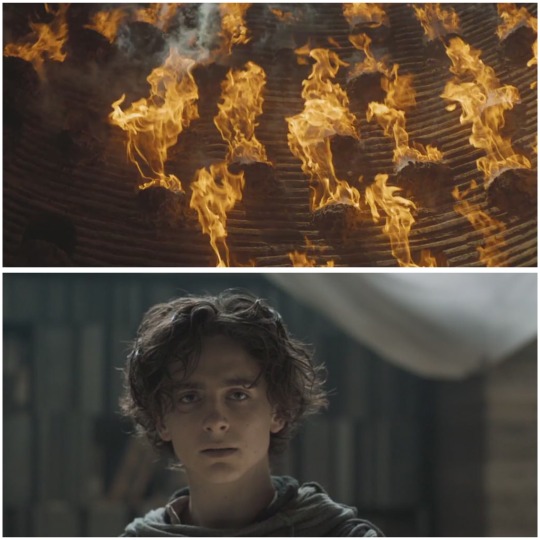
[…] less than a god, more than a man.
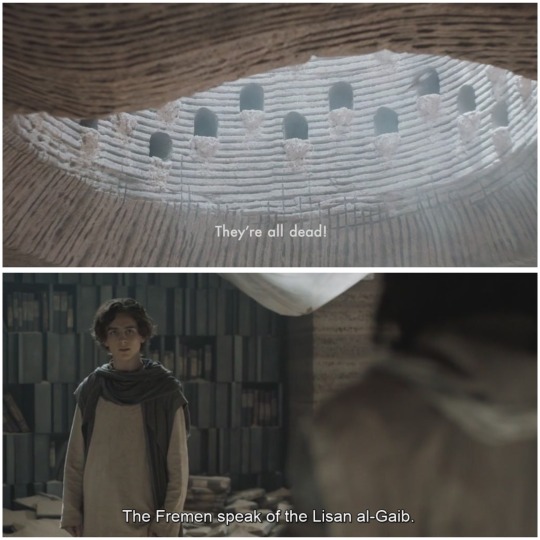
There is no measuring Muad’Dib’s motives by ordinary standards. In the moment of his triumph, he saw the death prepared for him, yet he accepted the treachery. Can you say he did this out of a sense of justice? Whose justice, then?
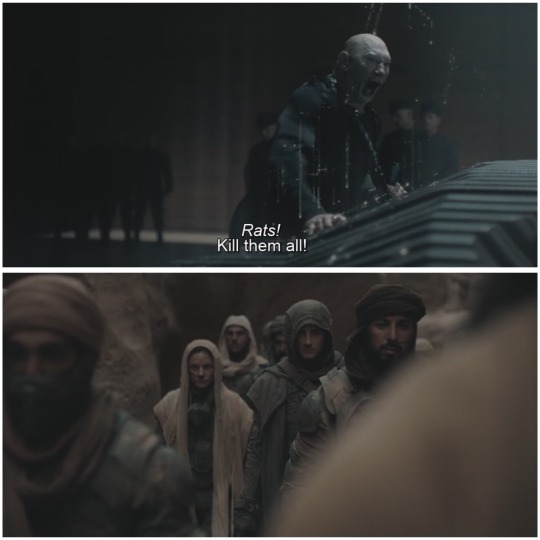
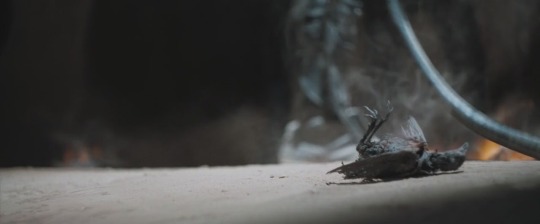
“I am the Kwisatz Haderach. That is reason enough.”
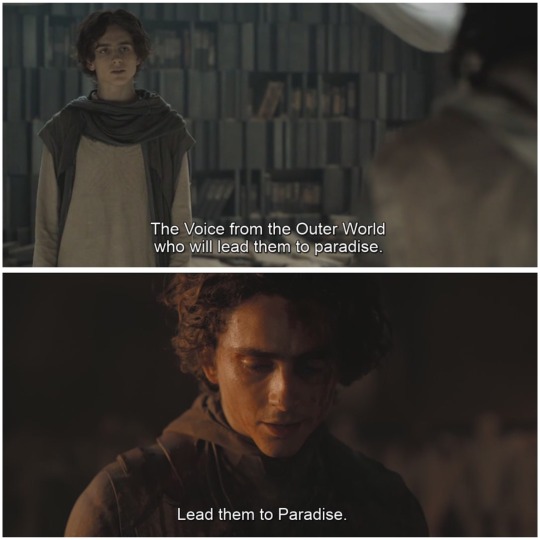
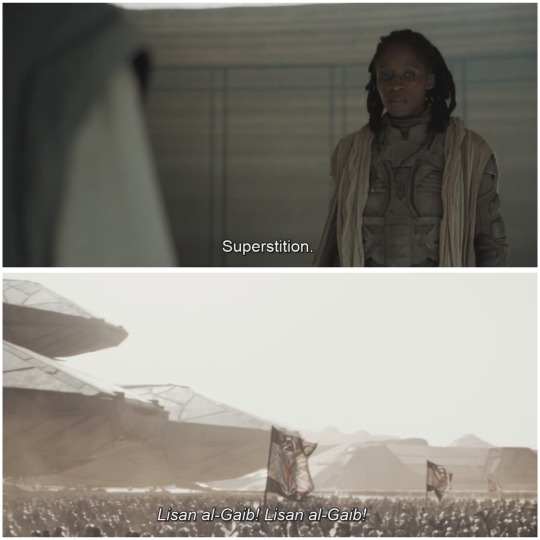
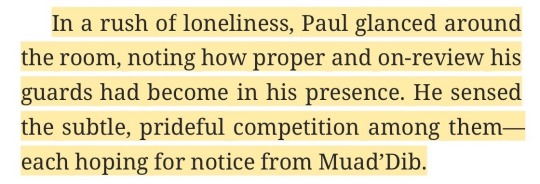
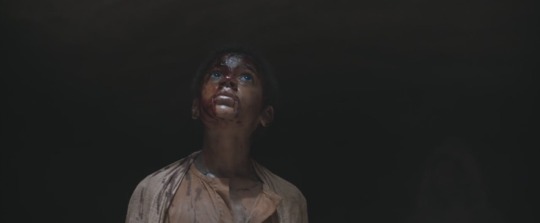
“The Fremen have the word of Muad’Dib,” Paul said. “There will be flowing water here open to the sky and green oases rich with good things.
Dune: Part One / Dune: Part Two / Dune Messiah by Frank Herbert / Dune by Frank Herbert
#dune#paul atreides#dune part two#dune part one#dune movie#dune books#dune messiah#dune quote#oh#can’t stop thinking about this little boy in part two covered in blood & watching how birds dying#I’m fine#the parallel between Paul and him#hiding in a hole in the ground!!!#denis villeneuve#crying screaming yelling#I really think about this little fremen boy since I first watch part two
84 notes
·
View notes
Text
me: so, they changed it. in the books, chani and paul have a child.
my brother: oh, they probably cut that because they didn't want to make paul a deadbeat dad!
me: uh... yeah... i don't think that's it.
#onion sprouting text#I REFUSE TO TELL HIM FUTURE STUFF -- I'LL HINT AT IT SURE. BUT. UM.#PAUL IS GOING TO REMAIN A DEADBEAT DAD AND I LOVE HIM FOR IT#i then explain the parallels between paul repeating his father's past and he's like 'ohh. okay.'#but i did v. much grin at 'paul's not going to be a deadbeat dad this time!!!!'#he will. and so leto ii will have to turn into a sandworm and tyrannize the galaxy for millenia bc paul refused to do it
2 notes
·
View notes
Text
Paul was an avid reader of comics ( Radio Fun , Beano , Dandy , Eagle and Boy’s Own Paper ) and was talented at art – he would draw witty caricatures of the teachers and pass them around the class for laughs.
Mark Lewisohn, Tune In
#i just love the parallels between him and John#it's so weird to me how thoroughly the legend permeated even my limited awareness#it genuinely shocked me to learn he could draw#paul mccartney#John Lennon#mark Lewisohn#tune in#Kris reads tune in#Kris talks a lot
12 notes
·
View notes
Text
In his seminal The Wretched of the Earth, Frantz Fanon could be writing about Gaza when he said: “In all armed struggles, there exists what we might call the point of no return. Almost always it is marked off by a huge and all-inclusive repression which engulfs all sectors of the colonial people.”
In Israel, Gaza and the West Bank, that point has arrived.
From Gaza to the Red Sea, on all fronts the West is now unmasked as a lawless killing machine in terror of losing control. Genocide, starvation and war, defended with Olympic-level diplomatic double-speak, are its only answers to the fact that the Global South, and the nations of the Middle East (if not their leaders) no longer wish to live under US hegemony.
Jean-Paul Sartre, in his preface to Fanon's work, wrote of western colonialism: “Our Machiavellianism has little purchase on this wide-awake world that has run our falsehoods to earth one after the other. The settler has only recourse to one thing: brute force… the native has only one choice, between servitude and supremacy.”
Fanon was a revolutionary thinker and a practising psychiatrist of colonial racism and its psychic impact on the colonised, and the coloniser. He and Sartre were writing about France’s imminent defeat in Algeria after seven years of brutal war.
[...] Western powers are involved in conflicts thousands of miles from home, as they were in Fanon's time in Algeria, Congo and Indochina. Today the western political class has united behind Ukraine and Israel, but for millions of people it is no longer clear that the wars are worth fighting.
As Yemen’s spokesman, Mohammed al-Bukhaiti, put it: “The war today is between Yemen which is struggling to stop the crimes of genocide, and the American and British coalition [who] support its perpetrators. Every party or individual in this world has two choices that have no thirds… who do you stand with as you watch these crimes?”
Fanon, writing 63 years ago, agrees: “The colonial world is a Manichaean world… at times this Manichaeism goes to its logical conclusion and dehumanises the native, or to speak plainly, it turns him into an animal. The native is declared insensible to ethics; he represents not only the absence of values, but the negation of values… he is the enemy of values, and in this sense he is the absolute evil.
“The native knows all this, and laughs to himself every time he spots an allusion to the animal world in the other’s words. For he knows he is not an animal, and it is precisely at the moment he realises his humanity that he begins to sharpen the weapons with which he will secure victory.”
. . . full article on MEE (1 Feb 2024)
You can also find a free copy of Fanon's The Wretched of the Earth on the Internet Archive (available as a PDF, EPUB etc.)
1K notes
·
View notes
Text
i saw dune part 2 with my boyfriend at a late showing on friday and i just realized something
the parallel between feyd rautha forcing rabban to kiss his boot before he replaces him as the governor of arrakis and paul forcing the former emperor to kiss the atreides signet ring when he ascends to the throne
#dune#dune 2#dune part 2#dune spoilers#their motivations were not entirely identical#but both were to cause humiliation#both were to subjugate their opponent#and both marked the beginning of their respective reigns#i'm thinking about dune too much now#paul atreides#feyd rautha harkonnen#denis you madman i have no idea what happens next
764 notes
·
View notes
Text
Dead cabin guy and his technicolor dreamcoat have haunted me since the wardrobe reveal in season two, and today im going to make it everyone's problem.
Travis wears the coat first. He and Natalie take the blessing and go out to look for Javi. Travis hallucinates (prophesies?) that Javi is dead and buried beneath the snow, but Natalie shows him it's only a fox. Travis finds the strange, mossy tree stump. The next day Travis has strong feelings about which direction is best to search for Javi in, and we don't see more of him until Nat reveals the bloody pants. Not that weird, all things considered. New season, new wardrobe additions. Hiking on a caloric deficit with PTSD, you'll probably hallucinate. Pretty standard stuff.
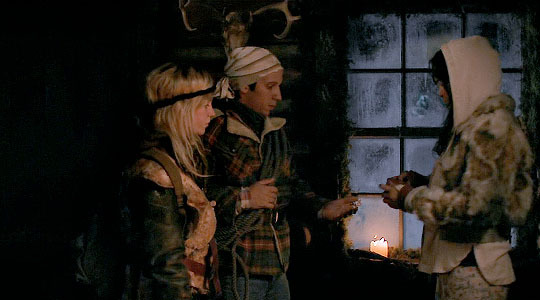
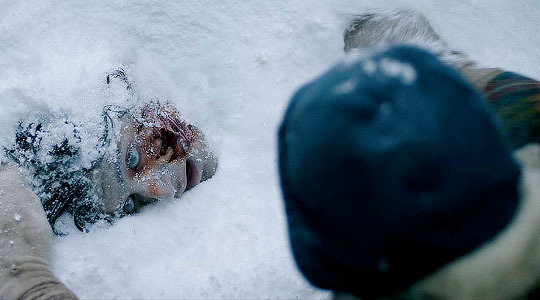
Then Nat wears the coat. She takes it to lay Jackie's bones to rest at the crash site, and while she wears it she sees (hallucinates? prophesies? I'm not sure!) the white moose that they'll later lose to the lake (ergo the hunt, ergo Javi dies for real but more on that later).

We get to Old Wounds, the hunting competition, and Lottie wears the coat now. You see where I'm going with this but just to be thorough: she enters the realm of death dreams, talks with Laura Lee, almost freezes to death.

Episode five. Melissa wears the coat. Maybe that's not important! Maybe it's just to show that they all share the wardrobe, and that the side characters are as equally All In This Together as the main characters are. Or it could mean something that a peripheral character, wearing important wardrobe, framed in antlers (not unlike Travis in 2.01), has the line "maybe he did die, and that's his ghost." It's a little suspicious, and at this point starts to feel like a pattern.
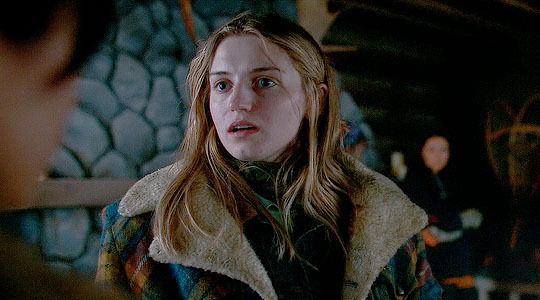
Who wears it next, who wore it best!? That's right baby, it's Paul! For his dreamworld drifter, hallucination hunk Coach Ben Scott. Nicholas Urfe himself. Ben spends almost all of his time in a dream, until *drumroll please* Paul, very pointedly, takes the coat and walks out the door. "Where do you think you are, Ben?" he puts the coat on. "You had to have known you couldn't stay here forever. [...] What matters now is that you aren't welcome here anymore." Following Paul means committing to death (to dream), and until interruption that's the choice Ben makes. Because letting Paul (and the coat) go would mean committing entirely to reality.
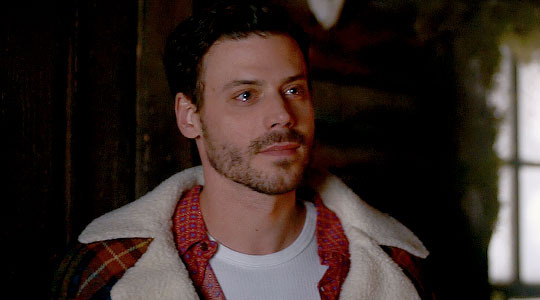
Of course, the pièce de résistance is something I didn't even notice until I went looking for it. The first dozen times I watched, I thought that after Lottie's beating Shauna brought her a blanket. "Lottie's cold." But she doesn't. She brings her the coat. Lottie is laying with it when, in a fever dream, she witnesses/hallucinates/prophesies parts of the hunt.
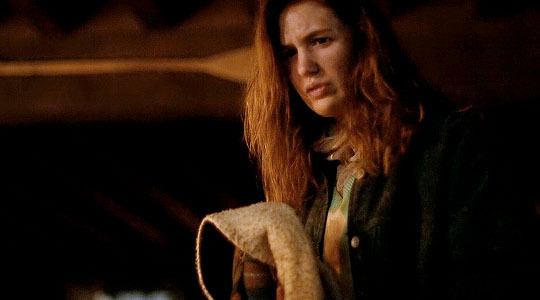
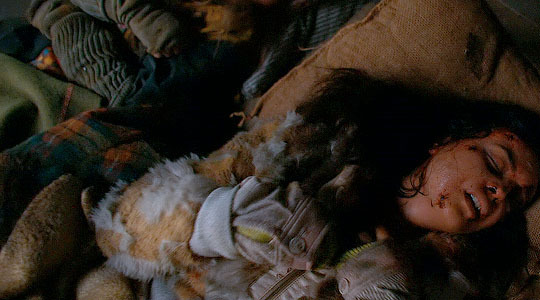
It's there again (on the back of the chair) when she sits by the fire and speaks for the wilderness, appointing Nat their queen. Ben watches, having woken from the dream himself, as they all bow to Natalie and leave reality behind for good.
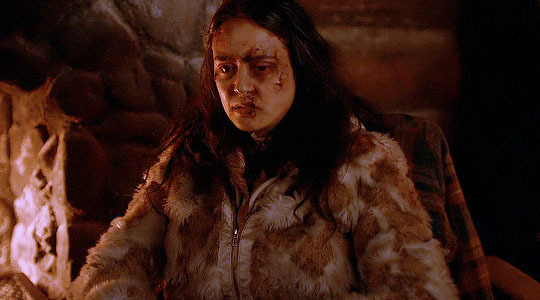
Of course, there are a lot of times when characters hallucinate strange things in the cabin while not wearing the coat, because they're all starving to death and traumatized. Mari. Shauna. Akilah. But in addition to that, it seems like a pattern worth noting that in each instance where a character wears the technicolor coat, the line between the real and the imagined seems to blur with more ease. Does dead cabin guy's technicolor dreamcoat help the Yellowjackets connect to the dream realm?
I'll be brief here with the biblical parallel: blah blah Joseph is the favorite son (you were always its favorite), his father gives him a technicolor coat (they're nothing special, they don't change color in the cold or anything). blah blah Joseph starts having prophetic dreams etc etc his jealous brothers throw Joseph down a pit (the wilderness chose) and bring his bloodstained coat back as false proof of his death (hanging on a branch. a couple miles back). You get my drift.
Does it mean anything? Who knows. But in a series where wardrobe is such an integral part of the storytelling, it felt worth paying attention to.
#yellowjackets#long post#travis martinez#lottie matthews#natalie scatorccio#melissa yellowjackets#paul yellowjackets#yellowjackets meta#javi martinez#shauna shipman#ben scott#akilah yellowjackets#mari yellowjackets
787 notes
·
View notes
Text
Hatchetverse Theory: The Parallels Between Paul (TGWDLM) and Grace (NPMD):
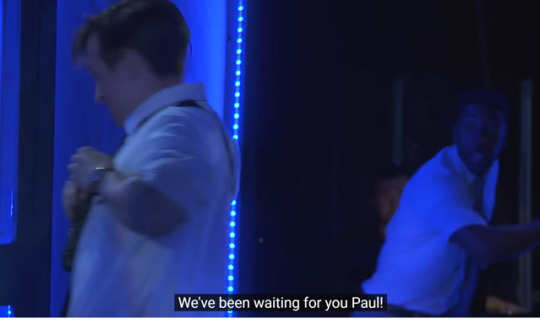

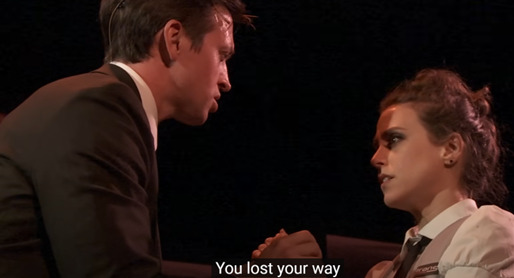





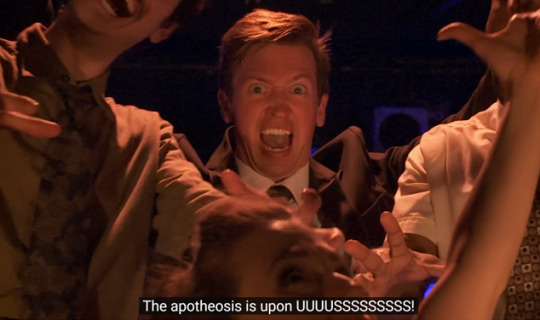
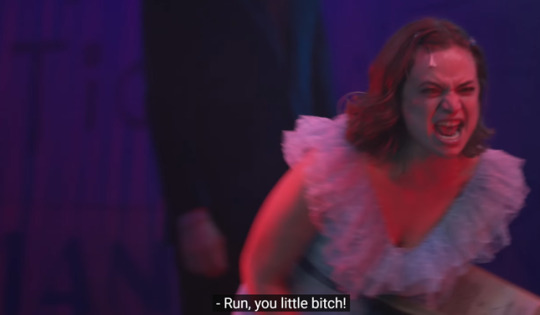
More thoughts and parallel screenshots under the keep reading, part of my #hatchetverse theory posts. Sorry these are all awful screen shots, I'm bad at gifs, but I hope I made my point.
The screenshots are pretty self-explanatory, but the parallels between Paul and Grace, especially with what happens to their characters at the end of their respective musicals, has been living in my head rent free, and I want to talk about it.
I've seen a lot of posts that speculate that the reason Grace went crazy at the end of NPMD is because she's just that blood thirsty and willing to kill, and while her character (at least of what I've seen of her in NPMD and what I've seen of nightmare time) is certainly intense, I wouldn't quite go so far to say she's always been that willing to hurt others, even for what she believes.
In fact, after rewatching NPMD, I realized something. When the kids first go to the Waylon Place, the others are the ones suggesting ways they can violently hurt Max. Pete even calls Grace's plan "goofy" and Richie is the one who suggests beating Max up. Grace is the one who tells them that all she wants to do is teach him a lesson and scare him and rejects their more violent ideas.
But after Max dies? That's when Grace's intensity starts taking a darker turn, and it's not as noticeable as it might be in the other kids because "Grace has always been kinda weird and intense" and the show has been playing that up for laughs since the beginning. But when you look at what happens to Grace in terms of her character's choices, she's the one who suddenly pulls a "bury the bully" plan out of nowhere when she was against even beating him up just a few hours ago. She's the one who suggests lying to the cops and trying to cover up what happened. She's the one who has a prophetic nightmare after the incident at the Waylon Place. That's also the moment when she symbolically loses her WWJD bracelet (though others have already pointed that out).
And if the LIB could infect Paul with spores just because he happened to be in close proximity to the meteor, then they could probably do something similar to any of the kids in the Waylon Place (and you cannot convince me that they were not the ones who collapsed the floorboards in the Waylon Place and killed Max).
But why would they target Grace you ask? Why not one of the other kids? That's a good question. I have a few theories.
The first has to do with what I mentioned before about hatchetverse's history of Webby's powers seeming to favor kids, and the LIB powers struggling to work on kids. We don't know how old most of the kids in NPMD are exactly, but the musical makes a point to tell us several times that Grace is "only 18" (Shaprio says she's a legal adult and will be tried as an adult in court). The musical also makes a point to have this be the Homecoming Dance (not Prom), which is in the fall, so most of the senior students wouldn't have turned 18 yet. We can also make an educated guess that Stephanie has turned 18 and Pete hasn't because she sings "wake me up when you turn 18" during their song. You could combat this by asking why the LIB never address Grace during the summoning and targeted Steph instead, which is a fair point. But interestingly, if you watch Grace, Steph, and Pete during the Summoning, Grace is silent most of the song, but looks completely horrified (especially when they tell her that they want what she cherishes most), despite the fact that from our perspective, the LIB aren't talking to her. She also seems to know exactly what the LIB want from her, because the next scene she's in is when she shows up to save Steph and Pete. During the Summoning, Pete, on the other hand, seems to mostly be involved in the conversation the LIB are having with Stephanie, although Grace also seems to understand what the LIB want from Stephanie. It's possible that this was intentional on the LIB's part, since they can see every timeline (in the "Abstinence Camp" episode of Nightmare Time, Grace gets between Steph, Pete, and Lumberaxe, risking her own life so that Lumberaxe doesn't hurt them. Grace might be willing to lose her own life for what she believes, but she might not be willing to lose her friends' lives. If the LIB know this, they'd likely want to make sure Grace understands that Steph or Pete will die unless she's the one who pays the price).
They have a personal reason for wanting her. In TGWDLM, Pokey hates Paul because...well, Paul doesn't like musicals but bigger picture, Paul resists Pokey's hive mind. Why would the LIB hate Grace? Possibly because she hates evil, the devil, and sin to an extreme degree. It could be a point of pride for the LIB: "we got the guy who didn't like musicals to join our musical and brainwash the world, and we got the girl who didn't like sin to devour souls for us." I've also seen a theory that Paul has some sort of resistance to the LIB because he doesn't like musicals and in a way sort of serves as a "prophet" in TGWDLM by warning others that musicals are bad. Grace arguably serves a similar role to Max in NPMD. She suggests Max becomes a better person "before he ends up in hell", which is ironic because then Max goes on to beat up Pete, which turns the nerds against him, setting off the chain of events that eventually lead him to actually being sent to hell (the black) by Grace. I've also seen some other theories suggesting that the LIB getting Paul in TGWDLM was really about getting Emma (since she was the one who starred in a musical before), and following that logic, it's possible that the LIB killing Max at the Waylon Place was really about getting Grace, because she'd still actually be alive. The LIB might have known this would work if they knew Max and Grace liked each other, and as seen in nightmare time, Grace is willing to risk her own life for her friends, and this might be consistent across several timelines.


Speaking of sacrifice, I know I covered this with the gifs, but the fact that Paul's last act was giving up his life, and Grace's was giving up what was essentially her morality and who she was so they could save their friends, only to have themselves turned into the very monsters they tried to destroy? Absolute tragedy.
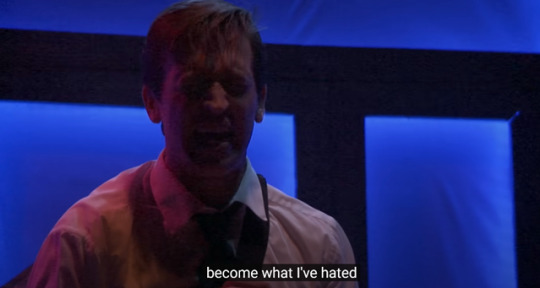

But what's also interesting to me is how this happens. The way Grace and Paul both seem to lose control of themselves. With Paul it happens in one song and is more noticeable, but with Grace, it's a lot slower, and the more bad and morally questionable stuff she does, the funnier it is, and her character has been intense and over the top from the beginning, so you almost don't notice the difference in her actions until you rewatch the show. But her and Paul asking "Who am I?" has a similar creepy vibe, the screenshots I found for those moments (pictured below) even ended up looking very similar, though with Paul, you can see more of the fight happening during the song, whereas with Grace, it's more drawn out over the course of the show with these little moments of clarity where she has a complete breakdown.
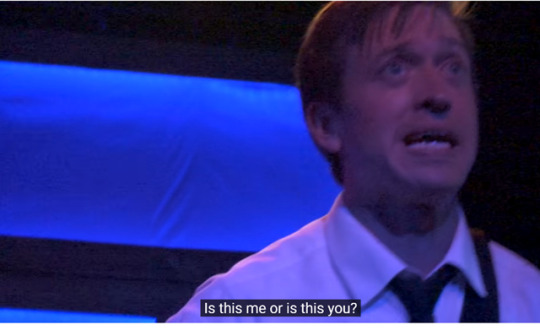
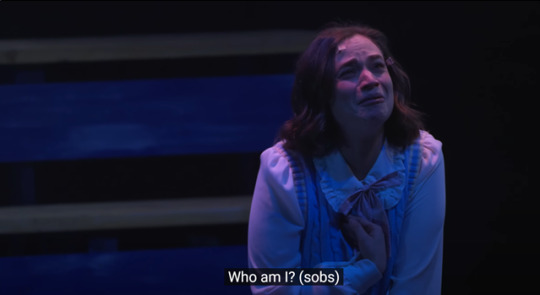
Then of course there's the whole: What do you want thing?
Why do the LIB want what Grace cherishes most? Why do they want Paul to want anything at all?
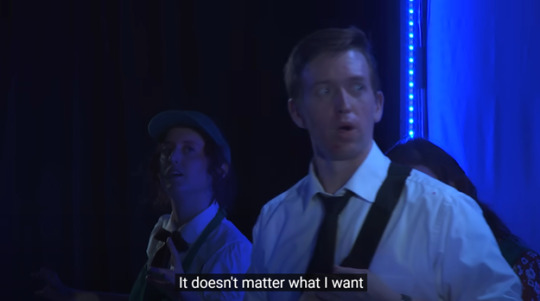
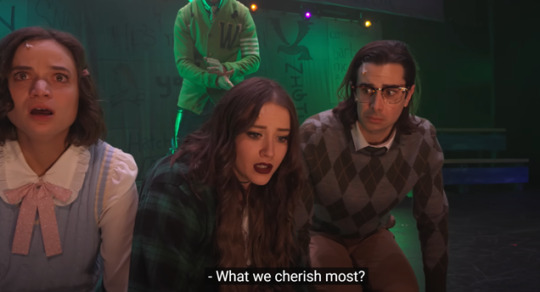
And why do they phrase it in the creepiest way possible, asking for "a peek at Paul's soul" and telling him to "give up his choice" and telling Grace that they'll get "whatever they want" and that she'll "be forever in their debt?"
Well, probably because that does seem to be what happens. The most obvious screenshot parallels are probably their final numbers in their shows, which I think speak for themselves. The only unknown is what exactly is happening with the LIB and their whole "what do you want" thing. By taking what someone wants, do they replace that "want" in the person with wanting to serve them? How does that work?
At this point, I'm not sure, and I'm too tired to continue the rant, but I'd be happy to hear anyone else's thoughts on this.
I hope you enjoy Starkid fandom. Thank you for listening to my rants!
#hatchetverse theory#hatchetfield#starkid productions#star kid#hatchetverse#the lords in black#grace chasity#paul matthews#nightmare time#the guy who didn't like musicals#tgwdlm#team starkid#npmd#nerdy prudes must die#hatchetfield universe#nerdy prudes spoilers#starkid npmd#starkid#grace chasity npmd#peter spankoffski#ruth fleming#richie lipschitz#max jagerman#lords in black#the summoning#npmd spoilers#nerdy prudes must die spoilers
663 notes
·
View notes
Text
The Jackson Family + Murder
The thing I love best about the Jacksons (and Poseidon by association) is how quick they are to shed their morals and commit *murder* to defend themselves or the ones they love.
Case 1: Poseidon - literally the first time he sees his son, he's handing Percy a tool to kill his abusive step-father. He's good about it too because he tells Percy, "whatever you choose know that you are mine." - Essentially Poseidon's saying that he won't judge Percy if Percy kills Gabe or lets him live. But he wanted Gabe dead, and he made it happen (albeit indirectly).
Case 2: Percy - he was 100% ready to kill Gabe the second he realized what Poseidon was talking about when he got the box with Medusa's head. At 12 years old. Ready to commit murder to defend himself from Gabe and protect his mom. Love this child.
Case 3: Sally - she was the one to actually kill Gabe. And it gets better because she sold his body for a ton of money and used that to get a new apartment and start college classes. Fucking amazing. What a queen.
Case 4: Sally (again) - In the battle of Manhattan, Sally wakes up presumably disoriented and sees demigods fighting a literal army of monsters. She doesn't hesitate, she robs a police car, gets a shot gun and joins the fight. I cannot say this enough. What a queen.
Case 5: Paul - In the battle of Manhattan, Paul also wakes up presumably disoriented and sees goodness knows what through the mist, but he knows enough from Percy and Sally to figure out what's happening. He grabs a sword of a dead demigod and starts killing monsters. He doesn't even know for sure if it's monsters he's killing - but he's doing his best to keep up with Sally and help the demigods + Percy out. Amazing. What a badass.
Case 6: Percy (again) - in Tartarus while being tortured by Akhlys, Percy flipped the tables on her and tried to kill her with the only tool at his disposal: her poison. He knew if he didn't Akhlys would've killed him and Annabeth and/or handed them over to Nyx. He tried using riptide and throwing his bag at her. When that doesn't work and he realizes he can use her poison he doesn't hesitate to do what he needs to survive.
I know this scene is kinda seen as out of character for Percy as he's pushed to the breaking point out of pain and fear but I want to draw parallels between this and Sally killing Gabe with Medusa's head. Don't you think that's how Sally felt, living with Gabe? She had to put up with his stink, his trash, his physical, mental and emotional abuse for years, and in the end she was nearly killed not knowing whether her boy reached safety.
These two Jacksons have been through so much, and it really shows in the extend that they're willing to go to live. They will do literally whatever it takes to survive and protect their loved ones, even if that something is brutal bloody murder. Love them for that.
#pjo#percy jackson#hoo#heroes of olympus#rick riordan#sally jackson#paul blofis#rrverse#percyjackson#percy jackson and the olympians#heroesofolympus#poseidon#jackson family#love them for this
475 notes
·
View notes
Text
in the book, i think paul’s death , the frenieres and their connection via slavery are more important mortals to book louis than his sister or mother. they both remain unnamed figures, tertiary symbols for how immortality and time strip u away from the mortal sphere. we have kalyne’s acting and the show to thank for making her a complex character.

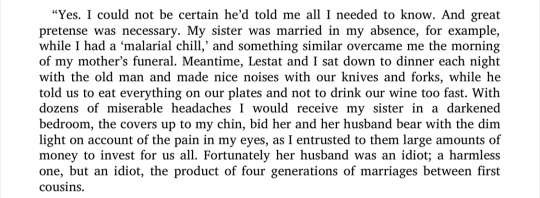
the show elevates the entire du lac family dynamic imo, paul’s one-dimensional fanaticism becomes a compelling sort of religious psychosis - a mad black man clinging to faith in a world that gave him very few other options. the ‘asylum in jackson’ at their time was a segregated facility that made their patients build the infrastructure themselves. the last sunrise book louis saw of his sleeping sister becomes the last sunrise show louis saw - his younger brother killing himself the morning after his sister’s wedding.


paul is also an introduction for the ‘roles louis (and paul, who is unable to) has to play’. unable to mask, paul propositions a lady of the night with the word of god. louis, who ‘did not want to draw a knife on [his] brother, but couldnt afford to look weak on liberty’, threatens paul. lestat is seduced not by the act alone, but the tempest in louis’s mind as he commits it. it is paul’s suicide that is the last time louis sees the sunrise, and grace + florence’s subsequent responses to it that drive louis in the drunken haze he was in before/while being turned. with the loss of paul, louis is the sole ‘aberration’ of their family while grace is the ‘good sister’ as kalyne coleman worded it.
grace’s arc in the show is rendered a fascinating parallel to louis’s. as pointed out in many gifsets + the like, grace is married proper while louis has a bloody vow of immortality in st. augustine’s. also grace, whos able to be properly married with children of her own, her expected role as a (cis) woman of her age, v. louis, whos rendered an immortal placee, who nearly eats his own nephew and weeps bc he cannot have ‘children of his own’ (unlike grace, is whats unsaid).
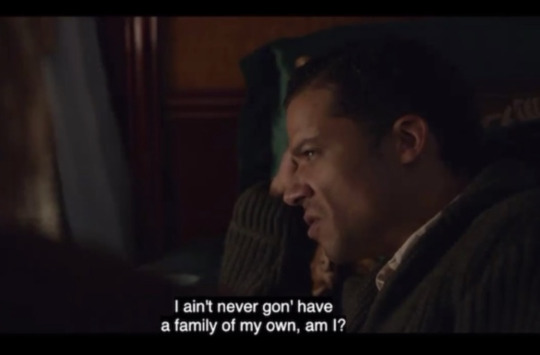

he desires to have a family to complete his companionship, and also to be in an ‘aberrant’ role for a man of his age. louis, in his adoption of claudia in the next episode, then brings her to the first time to his mother’s funeral, with a ‘family of his own’ to protect him from his mortal family’s dispute.
grace is also rendered a sort of babette here, as a mortal observer to louis’s immortality, who watches him be gradually removed from their day, and ends up parting with louis on vaguely similar notes - fear of the devil in louis.

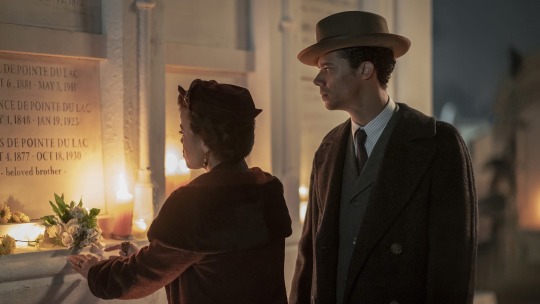

but where babette was terrified of book louis (& lestat, though she gave no indication of knowing they were both there) bc of his oppressive hunting of the people in his capture, bc louis+ lestat were threatening her for a way to escape to new orleans; grace in the show was burying the memory of the brother she once had, lost to the abstract devil that is immortality. its a coda, a sequel of sorts to the confrontation at the du lac mansion in episode 3, where florence calls louis the devil. grace buries louis with him standing there. the makeup is dubious, but grace is meant to be older as indicated by her attire + dialogue (“prayed myself old thinkin bout u”). babette’s departure from the narrative segways claudia’s entry, but in the show, grace’s departure from the narrative marks a turning point for claudia and louis. claudia watching louis weep over his own grave makes her believe she was ‘made to be louis’s sister’, and louis losing his last mortal connection marks a turning point that opens him for further abuse that very episode ends on.
all of this is to say this is an extremely compelling depiction of siblinghood, and how love can be lost and/or estranged between family.
195 notes
·
View notes
Text
Changes in Dune Part 2 I liked (not necessarily exhaustive):
Feyd-Rautha being tested in the same way that Paul was tested. A great way to turn them into parallels.
(Implicitly) Irulan getting the title Empress by marrying Paul. It bothers me that in the book she keeps being referred to as Princess. Even if Paul wanted to give her nothing else, at least the title is her right as his wife.
The Great Houses rejecting Paul's ascension. It was strange in the books when they accepted him and then he said "Let's do the Jihad anyways."
Most of all: The rift between Paul and Chani. The movies do go for the theme of resistance against foreign rule more explicitly than the books. The only thing I am wondering is: Are we supposed to just assume Chani is right, or is it at this point an open question?
#dune#dune (movie)#dune part 2#feyd rautha harkonnen#irulan corrino#paul atreides#chani kynes#(is she a kynes in the movies?)#colonialism and anticolonialism#adaptations
75 notes
·
View notes
Text
So, I've been thinking about the names in Dune. Specifically about the name Atreides. It means son of Atreus and is a reference to the Greek house of Atreus. They are cursed because Atreus grandfather Tantalos fed his own son to the gods. They noticed and revived his son (and that very same son would eventually become Atreus father) but because of that, the whole lineage was cursed. Atreus then had two sons named Menelaus (Helen's husband) and Agamemnon (the leader of the greek army in the Trojan war). Agamemnon now kills his daughter Iphigenia as a sacrifice for the gods so they can go to Troy. Because of that, when he returns he is immediately killed by his wife (who was Iphigenia's mother), Clytemnestra. However, they also have another daughter, Electra, and a son, Orestes. And it's him who I'd like to talk about. Because after the murder, Orestes is put in an impossible position: According to greek mythical law, you cannot kill your mother. Nonetheless, you're also obligated to avenge your father. Neither choice is the right one. Eventually, he chooses to kill his mother and avenge his father. And that is where I see a huge parallel between Paul and Orestes. Because Paul too is in a position where he can't really make the right choice. If he doesn't go to the south he won't be able to help the Freman and they may die, but if he does, he may (and does) cause a war that leads to the death of millions. Both are tragic protagonists in the sense of the greek tragedy. Both have to make a choice that at least seems to be impossible. They both choose to do what avenges their father. But the question is, did they really do it for the better good? Or are they just making a decision that brings them power? And while you can argue that Orestes at least in ancient tragedies doesn't have a choice due to his genre, is the same true for Paul? Or is he just hiding behind the idea of a tragic protagonist, denying his own responsibility?
#also I love that his father's name is Leto#since Leto is Apollo's mother who's the god of prophecys#and Paul is also able to see the future#I also saw Paul being called Orestes somewhere online#Is the name mentioned in the books somewhere?#Paul Atreides#dune#dune 2#Leto Atreides
95 notes
·
View notes
Text
religion and faith being portrayed so blatantly as tools for mass manipulation is actually so incredibly important. the fremen follow paul blindly in his quest for revenge under the belief that he will bring them paradise. in reality he is using them to fight his war. he’s not the good guy. he’s not a messiah. he just filled this role in a story that was made up by the bene ghesserit.
in reality he is an oppressor just like the harkonnens (there are so many parallels between him and Feyd-Rautha/his attack on the harkonnens in part two and theirs on the atreides in part one. he is actually a harkonnen. they aren’t any different.)
paul (at jessicas will) uses the fremen to gain power and control. he makes them into a loyal army by claiming to be their saviour and manages to completely change their way of life and their values (that scene where they burn the bodies of the harkonnens instead of turning them to water was so heartbreaking to me). he placed himself at the top of the dir society and gives himself a holy, untouchable status where his word is gospel and no one can challenge it (it is sickening how much this reminded me of ww2 germany where nazi propaganda became a replacement for religion and hitler was put in an almost godlike status)
the point is: faith is a powerful tool. it has been the reason for so many wars in history, because people use it to justify the cruelest of actions.
83 notes
·
View notes
Text
Something g that just hit me was that in the Dune books there is a repeated theme of parents forcing their kids to do something they desperately do not want to do. Which they keep in the movie to an extent but something something the parallel between Paul quietly talking to his father saying that he found his path and Jessica forcing him to become the Kwasit Heterac being more an active choice on her part
68 notes
·
View notes
Note
I'm curious if you have any thoughts on what Ben Paul would look like if he was alive years after S1 of TWDG :> I honestly prefer to imagine both him & Kenny going off on their own adventures after S1, because Idk if I'd've had Kenny as part of S2, it felt like when he returned it became less Clem's story & more his. That might be controversial among fans but it's how I feel :s I like to imagine Ben, Kenny & Sarita forming their own little family in fact <3
I'd expect Ben would end up with shaggier hair after a while but I wouldn't mind knowing what he'd look like with short, spiked up hair ;>
IM SORRY BOTH THE ASK AND DRAWING ARE OLD- but I came across the sketch I had eugeugeh. I do not have many headcanons but behind the cut is just a rant about. Kenny mostly. Too much should I warn? But yah I'm sorry it took me like 5 months lol
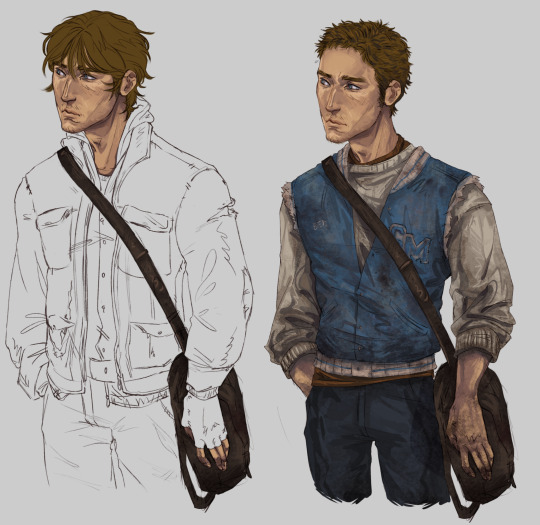
The only headcanon (regarding Ben's appearance) is that he'd keep his school jacket for as long as possible. Until it thorns apart. Or until he dies.
I'm big fan of Ben lives possibility btw I've gotta draw sum about that sometime (I say, about every twdg character i like,)
And dude, do I agree about Kenny. Man doesn't belong in season 2. The character they made him to be in the second season is not Kenny, it's just a nostalgia element. Don't get me wrong, I love the guy, I'm biased as hell, I break that hug choice every time. But it made the character development in the first season just.... pointless. "For some reason, I saved that piece of shit Ben", man, that quote just disappoints me. Kenny lost everything. Father and husband of none no more, which was pretty much the arc of Kenny on the first season?? I think? . Everything he loved and he had he lost, and he killed the person responsible for it. But not as revenge, he killed a kid out of mercy. He saved the boy from suffering a painful death, and that was forgiveness, to the reason he hadn't any. He took a decision he would be fully responsible of, when it was time for him to go. And he was perfect.
Hell, if he had appeared during season 2, I do prefer the Kenny as Carver idea. Clementine wasn't even that close to Kenny in the past, the player was, so even then it feels... off, off to be forced to care about a man that says so much he wants to protect you. (They're not really family, but is as if Kenny tries to protect and have Clem on his side, to have Clem's loyalty through and through. Though he does let her go and is proud of her on her individuality... hm.) But still, I mean, second season Kenny is not first season Kenny, and it isn't even a change that made sense. If he had been antagonist (which pretty much feels like it in the Canon story already), he should have had some other background story, no Sarita or company. Maybe then the cynical view he has would have mattered. The violence and anger and whatever else. For him to change that way was a consequence of him losing what he represented, protection of family? Wasn't failure and grief and acceptance meant to be important after all?
But otherwise yea I think it would've been pretty cool if Ben survived :3 I am a sucker for tales of redemption, forgiveness, and found family. And I hadn't thought about Kenny, Ben, and Sarita, but hell yeah. Man, even if they appeared in the second season, it would've been interesting if the choice wasn't between two individuals, but between two families. Ben already had a relationship with Clem! He appreciated her and calls her his only friend during season 1, he did leave her behind during that scene, -but the point of Ben was that- He was a coward all the season, until when he wasn't. He wanted to help Lee help Clem. They would've had an interesting sibling relationship-? also Ben had a young sister before the apocalypse so ooooh projection and parallels and shi. And if Ben had lived, he would've completed his development to something close to bravery-?
Well, I don't know, at least I think that'd be one interesting way to bring back old characters. Otherwise, Kenny should only be mentioned on dialogue maximum. The way I see it.
(I repeat the same thing over and over when I talk about something I'm sorry
(I've developed no language skills whatsoever in my life
(Yippee
86 notes
·
View notes
Text
FLORENCE, Italy – As Steven Stokey-Daley’s fall show in Florence during Pitti Uomo wrapped, the British designer, the 2022 recipient of the LVMH Prize for Young Designers, revealed longtime fan Harry Styles is acquiring a minority stake in the company.
Financial terms of the deal were not disclosed.
“Harry and I have a shared vision for the future of S.S. Daley and we look forward to this new chapter together as we focus on brand longevity and scaling the business into a modern British heritage house,” the designer, 26, said.
The pair was introduced by Styles’ stylist Harry Lambert, who masterminded the wardrobe for the artist’s “Golden” music video, outfitting him in Stokey-Daley’s graduate collection.
The investment is geared at building S.S. Daley’s direct-to-consumer business and forge ahead with plans for a “sustainable and long-term expansion,” the company said in a statement.
After graduating from the University of Westminster, Stokey-Daley made his London Fashion Week debut in September 2021 supported by the National Youth Theatre artistic director Paul Roseby, staging a four-part performance by members of the theater, riffing on British tailoring and tackling such topics as social class, inequality, school life, sexual awakening and homosexuality.
That same year, the S.S. Daley designer was among the recipients of the British Fashion Council’s Newgen initiative and was awarded again by the British fashion governing body the following year, with the BFC Foundation Awards.
The designer’s gender-fluid take on the uniforms of the British upper classes, such as wide-leg trousers, argyle-knit wool vests and embroidered shirts, appeals to a Gen-Z sensibility, and a growing female customer base. The brand is currently stocked in a handful of retailers, including Saks Fifth Avenue, Dover Street Market, Matchesfashion, Bergdorf Goodman, 10 Corso Como Seoul and I.T Store.
Attending the S.S. Daley show in Florence, Sir Paul Smith praised Stokey-Daley and said: “I think that the ideal thing [for him] would be to try and work in parallel with a commercial company that help him develop as a commercial designer, as well as creative designer. And of course, that’s what everybody dreams of. He has the balance between commerciality and creativity.”
“I think [his designs] might have had similarities in my earlier [career]… We are in 60-something countries now. So you have to be a lot more aware of commerciality and things that work for the shops especially right now because the business and around the world is so difficult for people,” Smith added.
Styles’ investment falls in line with a growing number of celebrities becoming brand shareholders. They include, among others, Oprah Winfrey and Reese Witherspoon who invested in Spanx; Priyanka Chopra and Nick Jonas in skiwear maker Perfect Moment; Beyoncé, Jessica Alba and Rihanna in French accessories firm Destree; Mila Kunis, Cameron Diaz and Gabrielle Union in Autumn Adeigbo, and Mark Wahlberg in Italian sneaker brand P448.
79 notes
·
View notes
Text
the curse of freedom vs ymir's curse
Last night I finished attack on titan - it was something i had been dreading and postponing for a while, having received a few spoilers from the manga and seen mixed reactions from fans.
I'm not here to judge wether it was good or bad, or to make huge analysis of it as a finale - after all, i'm still digesting and understanding where i stand regarding that.
However, while watching these last chapters, I felt really close to Eren's character. It's funny, because he is purposefully pushing everyone away from him, and for most of the season, we barely see him. He is hiding not only from his friends, enemies and from everyone in between, but also from the watcher. And weirdly enough, that's when I got time to really think about him - and specially after the finale, i felt like sharing some of those thoughts.
When we think of young Eren, the child we are first introduced to, we know that freedom is a very important part of his character. He wants to see the world, to know the truth, to go beyond. He's also obstinate, vengeful and stubborn. Eren is a great main character not because he is the most powerful, the smartest or most skilled, but because he has a personality that is intersting to watch. He is flawed, he is human. And even after getting it wrong multiple times and not being the best, somehow he is magnetic enough to keep the best, wisest and most skilled around - either to protect him of protect others from him.
Jean Paul Sartre says that humanity has the curse of freedom - a burden. It makes us responsable for our choices, making it both a gift and a curse. I kept thinking about it the entire time I was watching this last part of the anime.
Because freedom has always been a key element to Eren's character. Both literally - the freedom of being away from the walls and seeing the world, and figuratively - the freedom of making his own choices, deciding who to trust, fighting for what he thought was fair...
And the worst thing that could happen to him, happens: he is the titan that bares the memories from everyone who has been in that position before. From the moment the touches Historia's hand on, he can't go back - now past, present and future coexist, and his choices don't feel like his anymore - it's just fate.
It's Ymir's curse robbing him from the humanity's curse.
He sees the outcome and knows it cannot be changed. It's impacting because, being Eren, he will try to change it. It's who he is: stubborn, obstinate, vengeful. Obsessed with justice, obsessed with freedom. But now he can't. His entire life he felt in charge, deciding his own destiny based on his perceptions of justice, his bonds, his story. But now he is not so sure - how much was already decided? How much was like that because of the ones that came before? And how does one just keeps living like that, not only questioning everything, but also being aware of all those different memories that used to constitute very different people? But how different can they be, if they all share the same memories?
That's the beginning of the end for him. And he knows that reaching the sea doesn't mean he is free, like he used to believe. He knows that killing every titan won't make him free either, and killing everyone outside Paradis won't either. He's lost his freedom, his gift.
On the other hand, we have Mikasa. Eren tells her that (just like him), she is not free. Her every action to protect him, her love for him, is just the Ackerman's curse. And that's where he gets it wrong. Because Mikasa is free. And it's a burden and a curse for her, unlike for Eren, because it would be easier if she didn't have to choose between saving the world and saving her best friend, the love of her life.
Parallel, Ymir's love for the King kept her hostage, wasn't healthy, made her unable to stop what became her curse, what would haunt all Eldians.
Mikasa loves Eren - and not because of her clan's curse. It's hard to explain what exactly makes us love - we simply do. But to make a long story short, and in an oversimplification, she loves him because of everything they lived together and because she knows him. And her love could be like Ymir's, and keep her hostage too. For the most part of the show, fans made fun of Mikasa for her love, called her a simp, said it made her weaker. But she was the one who killed Eren, because she knew that it was the right thing, even if it was the hard thing. She knew there was no other way. And, deep down, she knew that it was not Eren anymore - and at least she could be the one to, at last, free him. Give him what he had been seeking his entire life.
And that act alone is what touches Ymir and frees her as well. It's not Eren's death. It's Eren's death by Mikasa's hand. It's knowing that love can coexist with all sorts of mixed feelings, and that the freedom that comes with our condition as humans sometimes means that we make choices not only based on our love, and not only because they're easy.
Staying is easier because it means not changing anything - and it feels like no choice was made. We trick ourselves into thinking that leaving, changing and doing the hard things are the only decisions, because they imply movement. But staying is also a choice. Not changing is also a choice. That's our curse: living with the outcome of everything we chose to do and everything we chose not to do. Owning up and taking responsability for staying and for leaving. For hesitating or killing.
And don't get me wrong: it is not easy. As humans, we also have the burden of emotions, mixed feelings, traumas. Ymir's choice - and her love - were so complicated that they paralyzed her. And it was seeing that Mikasa's love was so equally deep that ultimately it made her move to do the right thing what moved Ymir too. And she could finally let go, even if it was the hard choice - because she had Mikasa's example.
Mikasa didn't stop loving Eren just because she killed him. She hadn't stopped loving him when he was terrible to her. She never loved him because of the Ackerman's curse - when the curses ended, she kept the scarf. She loved him when she mourned, and loved him even when she was ready to move on, and she died loving him still - altought love can change troughout somebody's life.
Setting Eren free, she sat Ymir free. And that made all Eldians free - well, as free as one can be, still bearing the burden of humanity. The ending shows exactly that: we can't control what people do with their freedom: what wars are started, whos justice empears, which cycles are repeated. But we can control what we do with our freedom, our choices.
And, just like it was Ymir's curse that ended Eren's freedom, it was humanity's curse, Mikasa's freedom, that ended Ymir’s curse.
#attack on titan#snk#snk spoilers#aot#mikasa ackerman#character analysis#attack on titan finale#eren yeager#eren jaeger#ymir#curse#ymirs curse#freedom#shingeki no kyojin
46 notes
·
View notes